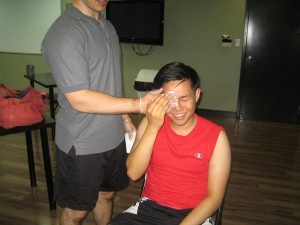Conjunctivitis is a common eye infection that affects both adults and children. This condition is often known as “pink eye” which involves inflammation of the conjunctiva which is the tissue that lines the interior surface of the eyelid and exterior coating of the eye.
The condition can be due to bacteria, virus, allergens, irritants or sexually transmitted infections. If caused by viruses, bacteria and sexually transmitted infections, they can readily spread from one individual to another but not a serious health issue if promptly diagnosed.
Symptoms
- Redness in the inner eyelid or white of the eye
- Increased tear production
- Blurry vision
- Thick yellowish discharge that crusts over the eyelashes upon waking up in the morning
- Itchy eyes
- Other discharge from the eye

You can apply a cold compress to relieve the symptoms as well as applying artificial tears for viral cases of conjunctivitis. - Burning eyes
- Heightened sensitivity to light
A doctor should be consulted if these symptoms are persistent. Remember that an ear infection can occur among children who have bacterial conjunctivitis.
Treatment for conjunctivitis
Bacteria
If conjunctivitis is caused by bacteria, it is managed with antibiotics prescribed by the doctor. It can be given as ointment, eye drop or pills. The ointments or eye drops are applied on the eye 3-4 times in a day for 5-7 days. In most cases, the condition must improve within a week.
Virus
This type of conjunctivitis is often due to common cold. Just like with common cold which is allowed to run its course, it is also the same with this condition usually lasting for 4-7 days. You can apply a cold compress to relieve the symptoms as well as applying artificial tears.
Allergies
If associated with allergies, it should be checked by an allergist and ophthalmologist. The condition subsides completely once the allergy is managed with antihistamines or once the allergen is removed. You can apply a cold compress over closed eyes for temporary relief.
Irritants
When managing this form of conjunctivitis, you have to use warm water for 5 minutes to wash out the irritant from the eye. Make sure that further exposure to the irritant is avoided. The eyes start to improve within 4 hours after washing.
Sexually-transmitted infections and opthalmia neonatorum
The same bacteria that cause sexually-transmitted infections such as gonorrhea and chlamydia can also infect the conjunctiva. Ophthalmia neonatorum affects children and spreads during birth as the infant passes via the birth canal of an infected mother.
How to relieve the symptoms
- Always protect the eyes from any irritating substances
- For those who wear contact lenses, it is vital to protect the eyes
- Apply a cold compress on the eyes and avoid sharing towels or washcloths with others.
- Always wash the face and eyelids using mild soap or baby shampoo and rinse using water to remove any irritant substances.
Prevention
- Avoid rubbing or touching the infected eyes.
- Always wash hands regularly using warm water and soap.
- Avoid using any eye makeup.
- Wash any discharge from the eyes 2 times a day using a paper towel or fresh cotton ball.
- All bed linens, towels and pillowcases must be washed in hot water and detergent.
- If possible, wear glasses instead of contact lenses. Disposable lenses must be discarded or ensure to properly clean extended-wear lenses and all eyewear cases.

